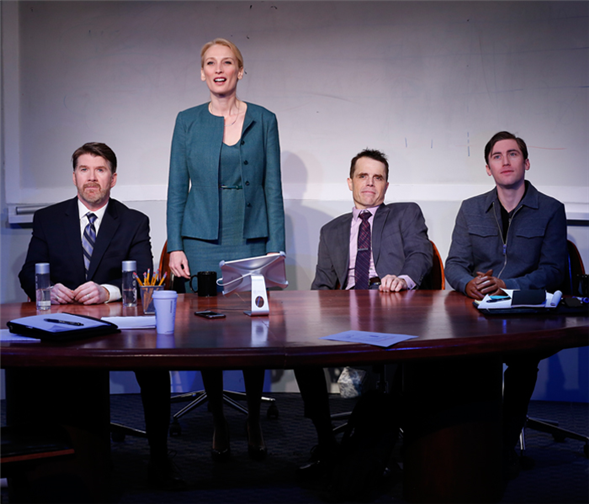Translate Page

Ideation finds pitch-black comedy in a corporate office
---
Give corporate America a whiteboard with some markers, and in less than ninety minutes, it could tell you how to make a clean job of genocide.
Set in a tidy conference room, Aaron Loeb's toothy satire Ideation ridicules the eponymous activity, a process known as "brainstorming" among those less studied in corporate jargon. The play, which runs through April 17th at 59E59, opens on a team of office drones devising the most efficient way to stop the spread of a deadly virus, pooling their ideas on a large whiteboard that looms on the back wall. One of their solutions is to round up the infected, dissolve their bodies in acid, and dump the remains at sea. Grisly, to be sure, but they tell themselves that it's for the good of global health.
As the story unfolds, however, they worry that the fruits of their labor may be used to less benevolent ends (like, say, mass killing).
Director Josh Costello says the company experimented with the tools of ideation while they were rehearsing San Francisco, where the play premiered two years ago. One day they worked in an office building full of nondescript rooms and whiteboards in order to try different methods of drawing the diagrams in the script. "We found some really cool things," Costello says. "Aaron ended up rewriting the script so that some of the charts we wanted to do would fit in."
The office-building outing also led to crucial discoveries about the play's tone. For instance, the actor Michael Ray Wisely settled on a tugboat doodle complete with puffs of steam and a smokestack, and while he drew, he toyed with funny sound effects, like whistling the theme from Popeye. The easygoing humor instructively clashed with the situation's gravity. After all, in the final staging, the cartoon appears beside a flow chart meant to elucidate the disposal of disease-infested corpses.
"So much of the rehearsal process has been about calibration," Costello says. "We want the play to be funny, and we want the play to be horrifying."
To that end, it matters that the characters have a knack for representing complex issues in the simplified forms of abbreviations, lists, and variables. This skill, with its shorthand and cold logic, lets them distance themselves from the atrocities they're plotting. When Wisely's character, Ted, catalogues the practical applications of their designs, he starts with the word "genocide," and by including the term on a neatly itemized list, he effectively erases the terror and chaos that come with the real thing.
So… should these office drones be held responsible for the consequences of their ideation? Will Hannah, the team leader, go along with the assignment despite her pangs of conscience? With an Ibsenesque knack for crafting ethical imbroglios, Loeb invites his audiences to ask themselves how they would act if they were in the room.
Costello says the theme of complicity also raises questions about the world beyond corporate America: "We are all complicit to some degree in global warming, and in the horrible abuses of our government and our corporations. We all go along with things because it's in our personal interest, and it's against our personal interest to take a stand."
---
TDF Members: At press time, discount tickets were available for Ideation. Go here to browse our current offers.
Gavin Whitehead is a writer and dramaturg based in New Haven, CT.
Photos by Carol Rosegg. Top photo (L to R): Michael Ray Wisely, Carrie Paff, Mark Anderson Phillips, and Ben Euphrat